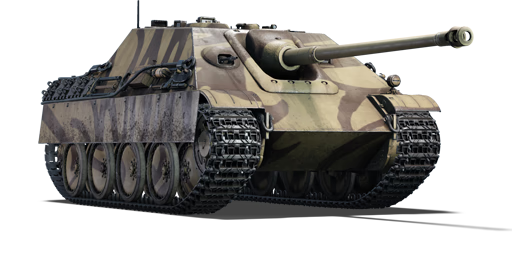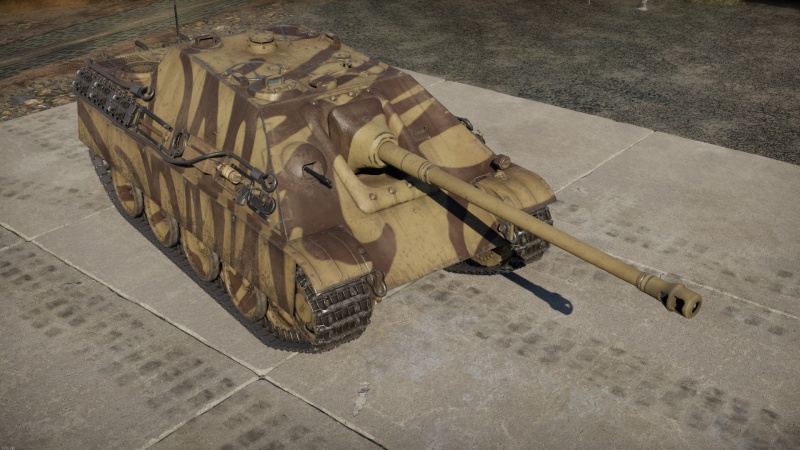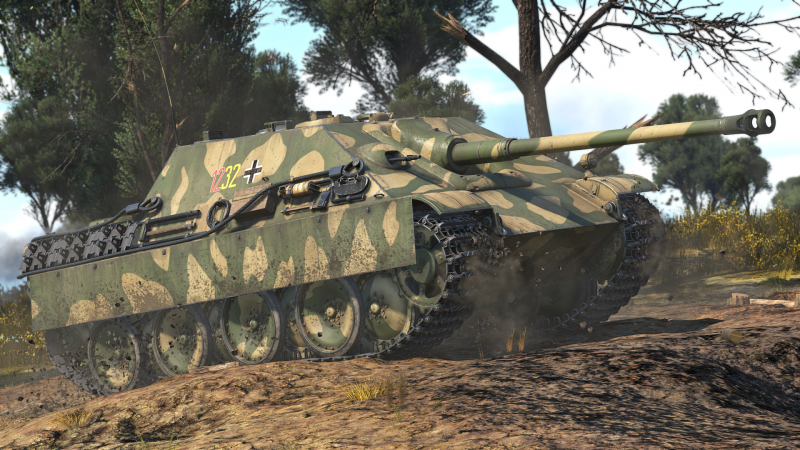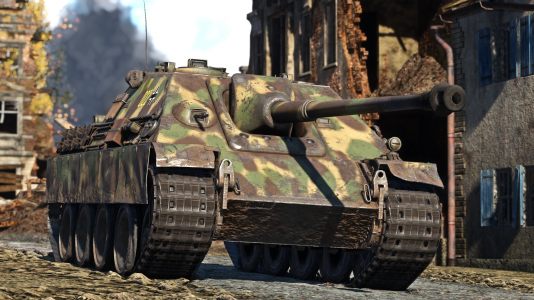Jagdpanther G1
| This page is about the tank destroyer Jagdpanther G1. For the premium version, see Bfw. Jagdpanther. |
Contents
Description
The Jagdpanther, Panzerjaeger Panther (8.8cm) Ausf.G1 (Sd.Kfz. Index: Sd.Kfz. 173) was one of the most powerful tank destroyers fielded by Germany in World War II. Based on the Panther tank, it was produced from 1943 to 1945 with a total of 413 units manufactured. The early variants of the Jagdpanther G1 were the first one to enter combat in 1944, armed with an fixed 88mm Pak43/2 cannon in a casemate configuration. The second version of the G1 was armed with a Pak43/3 instead of the /2. Other modifications included heat shields around the exhaust and a new gun mantlet. The vehicles were asigned to heavy tank destroyer battalions in the Western and Eastern Fronts, with most fighting against the Soviets at the East, and proved very successful.
It was introduced during the Closed Beta Test for Ground Forces before Update 1.41. The Jagdpanther is a well rounded tank destroyer, with adequate armour, speed and a very good armament. The tanks armour is average at best, but if used at a high angle, like hiding behind a small hill, it becomes much more efficient, being able to ricochet many rounds and many others won't be able to penetrate. The 88 mm cannon of the Jagdpanther is powerful enough to destroy even heavy tanks it faces, though be aware though that tanks like the IS-2 can stop your rounds from the front. Also be aware that the side and roof armour are very thin and the Jagdpanther is vulnerable even to autocannon fire.
General info
Survivability and armour
The armour of the Jagdpanther in itself is average but can be utilized to become extremely effective due to ricochet mechanics.
Lighter shells (i.e. 76 mm M1 from the Sherman, 88 mm L/56 from the Tiger I, 90 mm M3 from the Jackson/Pershing) will have issues with shells ricocheting off the front plate due to the angle of the tank's upper frontal plate. However, heavier and/or higher velocity shells (SU-152, IS-2, T29/T34 are examples of tanks that will not experience this problem very much) will not have this issue due to the weight or velocity compensating for the increased slope and penetrating anyway (that is not to say that these types of shells cannot bounce, it is just much rarer due to their weight and high velocities.)
The best way to use the Jagdpanther's armour is to find a small hill where you can angle the front of your tank upwards to where your gun can still fire back at incoming enemies, but also have your frontal armour maximized (due to the fact that your frontal armour will be at a higher angle for incoming shells, which will dramatically increase the odds of a shell ricocheting. ) Just be sure not to allow your bottom plate to be shown, as it is a potential weak point of the tank.
The side and rear armour of the Jagdpanther is extremely thin (AA guns often can penetrate) and should be protected at all costs (as your ammunition is also stored in the sides.)
Armour type:
- Rolled homogeneous armour
- Cast homogeneous armour (Gun mantlet)
| Armour | Front (Slope angle) | Sides (Slope angle) | Rear (slope angle) | Roof (Slope angle) |
|---|---|---|---|---|
| Hull | 80 mm (55°) Front glacis 60 mm (54°) Bottom glacis |
40 + 5 mm | 40 mm (24-26°) | 25 mm |
| Superstructure | Same as Hull | 50 mm (26-29°) | 40 mm (36°) | 25 mm (85°) |
Notes:
- Suspension wheels and tracks are 20 mm thick, though the interleaved pattern of the wheels provides cumulative 20 mm protection.
- Tracks and lower side of the hull are covered by 5 mm thick armour plate, protecting them from HEAT and HE shells.
- Rear parts of the upper side hull armour have tracks attached to it, adding additional 20 mm of armour.
- Belly armour is 20 mm thick.
Mobility
| Game Mode | Max Speed (km/h) | Weight (tons) | Engine power (horsepower) | Power-to-weight ratio (hp/ton) | |||
|---|---|---|---|---|---|---|---|
| Forward | Reverse | Stock | Upgraded | Stock | Upgraded | ||
| Arcade | Expression error: Unexpected * operator. | 852 | Expression error: Unexpected round operator. | __.__ | |||
| Realistic | 531 | Expression error: Unexpected round operator. | __.__ | ||||
The Jagdpanther G1 has decent mobility overall, however, there is one major downfall to this vehicle: its extremely slow reverse speed. For this reason, the Jagdpanther G1 cannot relocate quickly so it is best to position your vehicle in a spot where repositioning won't be necessary.
Modifications and economy
Armaments
Main armament
The main armament of the Jagdpanther is the 88 mm PaK43 gun, which is one of the best all-around tank weapons at its BR. With an 11-second reload stock, it is accurate as well as causing large amounts of damage during a penetrating hit, as it also contains explosive filler that detonates once inside the hull of the target.
| 88 mm PaK43 | Turret rotation speed (°/s) | Reloading rate (seconds) | |||||||||||
|---|---|---|---|---|---|---|---|---|---|---|---|---|---|
| Mode | Capacity | Vertical | Horizontal | Stabilizer | Stock | Upgraded | Full | Expert | Aced | Stock | Full | Expert | Aced |
| Arcade | 49 | -8°/+14° | ±11° | - | 7.0 | 9.7 | 11.8 | 13.1 | 13.9 | 9.75 | 8.63 | 7.95 | 7.50 |
| Realistic | 4.8 | 5.6 | 6.8 | 7.5 | 8.0 | ||||||||
Ammunition
- PzGr 39/43, APCBC: stock ammunition, is by far the most useful ammunition for this tank and should be the primary type you carry through your battles.
- PzGr 40/43, APCR: although on paper it appears to be a significant improvement in penetration capabilities, in reality it is often ineffective for two reasons:
- The amount of damage the shell creates within the hull of tank upon penetration is very little, with little to no shrapnel being created by a penetration. This makes a direct hit onto a critical module (such as a gunner or an ammunition rack) a necessity for this projectile, which can be sometimes difficult depending on the enemy you are facing.
- Although the stat card shows that the penetration does increase, due to the overall weight of the shell decreasing, sloped armour is much more difficult to penetrate (which at this battle rating is very common.) This makes this shell somewhat useless as a result, with the standard ammunition (PzGr 39/43) being far more effective against slopped armour.
- Hl.Gr 39, HEAT: it serves very little purpose, as it lacks enough penetration to penetrate tanks from the front (or even side at the battle rating of this tank).
- Sprgr.43, HE: it is ineffective against armoured targets, and should only either be carried for open-topped vehicles (SPAA/TD).
| Penetration statistics | |||||||
|---|---|---|---|---|---|---|---|
| Ammunition | Type of warhead |
Penetration @ 0° Angle of Attack (mm) | |||||
| 10 m | 100 m | 500 m | 1,000 m | 1,500 m | 2,000 m | ||
| PzGr 39/43 | APCBC | 237 | 234 | 222 | 207 | 193 | 180 |
| PzGr 40/43 | APCR | 279 | 273 | 252 | 227 | 205 | 185 |
| Hl.Gr 39 | HEAT | 110 | 110 | 110 | 110 | 110 | 110 |
| Sprgr.43 | HE | 19 | 19 | 17 | 16 | 14 | 14 |
| Shell details | ||||||||||||
|---|---|---|---|---|---|---|---|---|---|---|---|---|
| Ammunition | Type of warhead |
Velocity (m/s) |
Projectile mass (kg) |
Fuse delay (m) |
Fuse sensitivity (mm) |
Explosive mass (TNT equivalent) (g) |
Ricochet | |||||
| 0% | 50% | 100% | ||||||||||
| PzGr 39/43 | APCBC | 1,000 | 10.16 | 1.2 | 14 | 108.8 | 48° | 63° | 71° | |||
| PzGr 40/43 | APCR | 1,130 | 7.3 | - | - | - | 66° | 70° | 72° | |||
| Hl.Gr 39 | HEAT | 600 | 7.64 | 0 | 0.3 | 1,100 | 62° | 69° | 73° | |||
| Sprgr.43 | HE | 820 | 9.4 | 0.2 | 0.1 | 1,000 | 79° | 80° | 81° | |||
Ammo racks
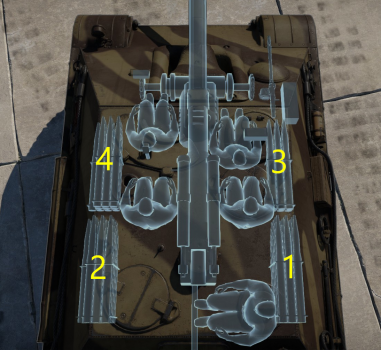
| Full ammo |
1st rack empty |
2nd rack empty |
3rd rack empty |
4th rack empty |
Visual discrepancy |
|---|---|---|---|---|---|
| 49 | 35 (+14) | 17 (+32) | 11 (+38) | 1 (+48) | No |
Machine guns
The machine gun on this tank is functional but is not powerful enough to cause any damage even to lightly armoured targets (such as AA vehicles).
| 7.92 mm MG34 | ||||
|---|---|---|---|---|
| Mount | Capacity (Belt) | Fire rate | Vertical | Horizontal |
| Hull | 3,000 (150) | 900 | -5°/+10° | -10°/+5° |
Usage in battles
The Jagdpanther is best used defensively, to cover capture points and prevent their capture, and cover friendly tank advances. It's highly recommended to hide the lower frontal plate in this tank, as it has a frontal mounted transmission which will set the tank on fire if shot, as well as destroying the transmission. It's also strongly advised to use this tank at long range, and change position often.
It is important to keep in mind that the Jagdpanther's armour is sloped. Using it on the side of a hill facing the enemy is extremely dangerous since this would decrease the angle at which the frontal armour and sloped and thus negate a large part of its survival capabilities. By hiding behind buildings, trees and bushes, or on top of a hill, you optimise it's fighting capabilities. A well-positioned Jagdpanther is very hard to destroy. In addition, using the Jagdpanther in a diamond position (with your right side facing the enemy) will mean that your most important crew members are better protected (driver, gunner, commander) since they are on the other side.
Enemies worth noting:
- IS-2, ISU-122, SU/ISU-152: The Jagdpanther relies on its frontal armour a lot to survive, so the biggest threats are generally the vehicles with high penetration. These machines with high calibre guns pose the biggest threat, as their APHEBC shells will slice through the Jagdpanther's frontal armour like butter, and their damage is more than enough to kill all the crew inside. Try and finish them off first before they see you. If they do, quickly go to a nearby cover and either call for help, or wait until they fire or get distracted.
Pros and cons
Pros:
- Armed with the long 88 mm KwK43 gun. One of the best pound-for-pound guns in the game thanks to the great accuracy, penetration, damage potential, and rate of fire
- The default APCBC shell has great accuracy, penetration, and damage potential at all ranges
- Really good top speed and manoeuvrability. Makes getting into a strong early game position a breeze
- The tank is based on the Panther chassis, meaning the frontal armour is really strong against guns packing less than 200 mm of penetration
- Carries a large amount of smoke grenades
- 5x Sight provides sufficient zoom for most engagements
- Despite not having a turret, the tank still has good gun depression
Cons:
- Terrible reverse speed. Shoot and scoot tactics are nearly impossible to pull off
- The hull armour is tough, but common enemy tanks like the Centurion Mk 3 and IS-2 laugh at the Jagdpanther's frontal armour
- Terrible side armour. Angling is ill-advised
- Like most tank destroyers it lacks a turret. Coupled with the terrible reverse speed, getting flanked is almost always a death sentence
- Despite the 5 men crew, the crew compartment is small. Any APHE shell that penetrates the armour will likely knock out all the crew in one shot
- Despite not having a turret, it's still a big tank. Finding proper concealment can be a challenge
- Roof armour is weak. Attackers and even some fighters machine guns can be lethal
- The HEAT and HE rounds are completely useless while the APCR has mediocre penetration and damage potential. Don't bother taking anything but the default APCBC round into battle
History
Development
Nazi Germany created the formidable 8.8 cm Pak43 anti-tank gun, a longer version of the 8.8 cm KwK36. 2 attempts were made to fit this gun onto a self-propelled configuration, the first was Panzerjäger Tiger (P) Ferdinand (later Elefant) and the second was the Nashorn. However, the Ferdinand was too heavy and unreliable while the Nashorn was too small and underpowered to propel such a gun. The Jagdpanther was proposed in late 1942, as a tank destroyer from the Panther chassis that could mount the formidable 8.8 cm Pak43 with good armour and speed. The tank destroyer was created and designated Sd.Kfz. 173 and was demonstrated to Hitler on October 1943. Production then started in January 1944 under the simpler name Jagdpanther by Hitler rather than using the longer 8.8 cm Pak43/3 auf Panzerjäger Panther.
Throughout its production life of January 1944 to 1945, 415 total of these vehicles were made. MIAG produced 270 from January 1944 to the end of the war, MNH produced 112 from November 1944, and MBA produced 37 from December 1944. The supposed goal was 150 Jagdpanther produced a month, but Germany's deteriorating situation made this impossible. The Jagdpanthers were made in two variants, G1 and G2. The G1 had a modified Panther Ausf. A engine deck while the G2 had a modified Panther Ausf. G engine deck. Several changes were implemented throughout its production and as such some features were exclusively present on G1's. Examples include a smaller, and internally bolted gun mantlet/mounting, a monoblock 8.8 cm PaK 43/3 and a three piece exhaust system. A proposal to mount the 12.8 cm Pak80 was mentioned but never came around to production.
The Jagdpanther was a rather good design as a tank destroyer, it had a good power-to-weight ratio and had a gun that could destroy any Allied tank in service in the war. It did not suffer as much reliability problems due to being based on the later model Panther Ausf. G, which had most of the initial problems fixed. It also used an improved transmission and final drive (the two sources of most Panther issues) that was planned for the Panther II.
Combat Usage
Jagdpanthers were assigned to heavy tank destroyer battalions in the Western Front and Eastern Front, though most of the Jagdpanthers were sent to deal with the Soviet onslaught, where it first saw combat action. In Normandy, few of these vehicles were encountered by the Western Allies, though 12 were deployed in one occasion by the 654 schwere Panzerjäger-Abteilung against British units. One instance in July 30, 1944 saw three Jagdpanthers engage and destroy 10-11 Churchill tanks in about two minutes, though two of them were abandoned by the crew due to damage. The 654th was the only battalion to have a full complement of Jagdtigers of about 42 Jagdpanthers at the Western Front, the 559th battalion only had 10 to 14 of these vehicles. The largest concentration of the Jagdpanther on the west was during the Ardennes Offensive of about 20 vehicles combat-ready.
After the end of World War II with Nazi Germany's fall, the Jagdpanther and its original Panther configuration saw service with France. The Jagdpanthers served France from 1945 to the 1960s.
| Archive of the in-game description | |
|---|---|
|
One of the most powerful and most successful German tank destroyers of World War II. This tank destroyer was designed by the company MIAG and was based on the Pz.Kpfw. V Panther tank. From October 1943 to April 1945, the MIAG, MNH, and MBA factories produced a total of 413 Jagdpanthers. The Jagdpanther was mass-produced in three variants which differed in the following ways. The first variant was the early version of the G1 self-propelled gun, produced from January to September 1944. These vehicles had an 88 mm 8,8 cm Pak43/2 gun with a one-piece barrel. The gun was fixed to the front armour with bolts inside the vehicle. Anti-magnetic Zimmerit paste was applied to the vehicle's vertical surface in its characteristic squares. Also, this variant lacked a snorkel. The plate covering the engine either completely lacked an opening or had an opening which was plugged closed. The second variant was the standard G1, which had an 88 mm 8,8 cm Pak43/3 gun with a composite barrel. This tank destroyer also received a new gun mantlet. Zimmerit was not applied. Heat shields were installed around the exhaust pipe, and the guide wheels had a larger diameter. The third variant was the G2, which was equipped with a new gun mantlet reinforced with bolts. An armoured plate taken from the Pz.Kpfw. V Ausf. G Panther tank was installed over the engine. The trenching tool and cleaning rod tube was moved to the rear. This tank destroyer was a very effective weapon against all types of Soviet and Allied tanks. It was used on the Western and Eastern fronts until the end of the war. For a heavy vehicle, the Jagdpanther had good speed and manoeuvrability. On the other hand, this self-propelled vehicle inherited a number of disadvantages from the tank it was based on, primarily low mechanical reliability and relatively thin side armour. | |
Media
- Images
- Skins
- Videos
See also
- Related development
- Other vehicles of similar configuration and role
External links
| Germany tank destroyers | |
|---|---|
| Pz. I Derivatives | Panzerjäger I |
| Pz. II Derivatives | 15cm sIG 33 B Sfl |
| Pz. 38(t) Derivatives | Marder III · Marder III H · Jagdpanzer 38(t) |
| Pz. III Derivatives | StuG III A · StuG III F · StuG III G · StuH 42 G |
| Pz. IV Derivatives | Jagdpanzer IV · Panzer IV/70(A) · Panzer IV/70(V) · Dicker Max · Nashorn · Brummbär · VFW |
| Pz. V Derivatives | Jagdpanther G1 · Bfw. Jagdpanther G1 |
| Pz. VI Derivatives | Sturer Emil · Elefant · Ferdinand · 38 cm Sturmmörser · Jagdtiger |
| Wheeled/Half-track | 8,8 cm Flak 37 Sfl. · Sd.Kfz.251/9 · Sd.Kfz.251/10 · Sd.Kfz.251/22 · Sd.Kfz.234/3 · Sd.Kfz.234/4 · 15 cm Pz.W.42 |
| ATGM Carrier | RakJPz 2 · RakJPz 2 (HOT) · Wiesel 1A2 |
| Other | Waffenträger · M109G · JPz 4-5 · Raketenautomat · VT1-2 |


